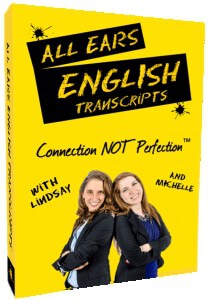
Do you know how to respond to a question in English?
Do you always have the answer to something that somebody asks you?
Have you heard the words “respond” and “answer” and felt a bit confused about which one to use when?
Many of us struggle with this and therefore it can be rather difficult to know which one to use when in English.
We’re going to go through when each word works, look at some examples, and help you to understand when to use each one in conversation.
Get Your Transcripts Today!

Make sure you understand every word you hear on All Ears English.
Bring your English to the advanced level with new vocabulary and natural expressions.
Subscribe and get the transcripts delivered by email.
Learn to speak naturally with the American accent.
Click here to subscribe and save 50%
I love when we get questions about really nuanced words. We have one today!
Hey girls!
I really love your podcast, and I thank you so much for it! I have a question that I’m hoping you can help to answer. Can you explain what is the difference between answer and respond? I hear both used in conversation and I feel unsure about how they each work.
Thank you very much!
Understanding A Difference In Words
This is a great question about a rather tough difference to detect.
This is one of those instances in English where we can give you the basics and talk about chunks to help make it easier to understand.
You can use answer as a verb, or as a noun. In this case you would say “I need an answer.”
You can use respond as a verb, or as a noun. In this instance you would say “I need a response.”
We can get into a lot of grammar on this one and we could give you a whole list of tiny differences that you may never be able to see on your own–but that’s not how we work.
At All Ears English, we like to boil it down to how it is used so that you can have a practical and functional usage for it first and foremost.
In general, you will find that answer is used more frequently than respond in conversation.
Answer is generally used in response to a question, and may seem a bit less formal than respond.
Respond is a bit more general and you can do more with it in a conversation.
You can respond to a situation or a feeling and so you can see where it is used.
You can also use it to answer a question, but that seems a bit more formal in its usage.
Looking At Some Examples
This is one of those things that can be best seen when you go through some examples.
The differences are so minor and it can be a bit confusing until you see it in practice.
We’re going to provide you with examples where you can see each at work and then you can compare and contrast them.
- “Please answer questions 1 through 6 in 30 minutes.” vs. “Please respond TO questions 1 through 6 in 30 minutes Both of these are fine, but .” –both of these are fine, but in this instance respond more open ended, whereas answer could be either more open ended or multiple choice. You just have to consider the context here so that it makes sense.
- “I answered my friend when she asked for a ride.” vs. “I responded to her question by rolling my eyes.” Either could work here but you might be more apt to use respond here simply because it seems to fit better.
- “Can you answer the door/phone? I’m finishing my lunch.” You will find that answer is usually associated with things like phone calls and doors.
- “She didn’t respond to his email until a week after she sent it.” or “I’ll respond to your text in a second.” Respond works well for things like text messages, letters, and emails. So you see that the usage and context is crucial to understanding things here.
This example appeared on a discussion board, and may be something that you see within politics.
You might see something like this used for a President, by the media, or even in a debate.
If you think of something like “You didn’t answer my question”, they may have responded but not provided an actual answer.
So here, respond is more general, whereas answer is almost a piece of the response where there is more of a conclusion.
These are all slight differences, but it starts to make sense when you look at them compared to each other.
Let’s look at some more examples that may help you.
Additional Examples To Demonstrate The Differences
Because the differences between “answer” and “respond” are so slight, we’re going to look at this a little further.
The more that you see these examples the more that you can get a feel for how each word can and should work.
- “He asked her to marry him. She responded by crying before she gave her answer, which was no.” You can see that each word fits perfectly into that scenario and has its own place.
- “How should we respond when customers ask us about our new policies?” This is more formal and clearly used in a work type of setting, so it’s more professional.
- “He doesn’t respond well to negative press.” Again this sounds more formal and may be referring to somebody higher up. This may be political or very visible in the media.
- “The mayor responded to the letters sent to him by the community.” This is the same sort of situation where it’s more formal and therefore professional in nature.
- “The mayor answered the audience’s questions.” You can still use answer in a more formal setting as you can see here. It fits better and you can see that in this example.
- “The company told me they would have an answer for me by Tuesday as to whether or not I got the job.” This is another one where it may be hard to gauge but you can see what fits better.
- “He responded negatively when he was told he wasn’t needed for the project.” Respond may not always necessarily be to a question, because it may just be to something someone said.
The basic thing to remember is that response is usually more general, and could be more open ended.
Answer is more direct or at least it should be, as it’s more about a question.
Respond can be to many things and answer is typically more direct and to the point.
Roleplay To Help
In this roleplay Lindsay is helping Michelle practice for a job interview.
Lindsay: “Okay so how long have you been in this field?”
Michelle: “Wow, how do I answer that? A long time!”
Lindsay: “Hmm, I think you need a more concrete answer when you respond to that question.”
Michelle: “Sorry, I don’t respond well to practice situations. I always feel so funny.”
Lindsay: “That’s okay. One sec, gotta respond to my texts. Did you answer Judy about the party?”
Michelle: “Yes, I told her I can’t come. I think I hear the door. Can you answer it?”
Lindsay: “Sure!”
Takeaway
The thing to remember is that these are very nuanced terms.
We gave you some of the basics today, but rules are broken and they will be from time to time.
It may be helpful to you to look for examples in the news and when you hear people speak.
As you are listening, try to identify when people use different words in this way.
Soon we can do an episode on specific collocations and expressions to help with this even more.
For now though, try these out in conversation and see what sounds natural to you!
If you have any questions, please leave them below in the comments section.
We’ll get back to you as soon as we can.








